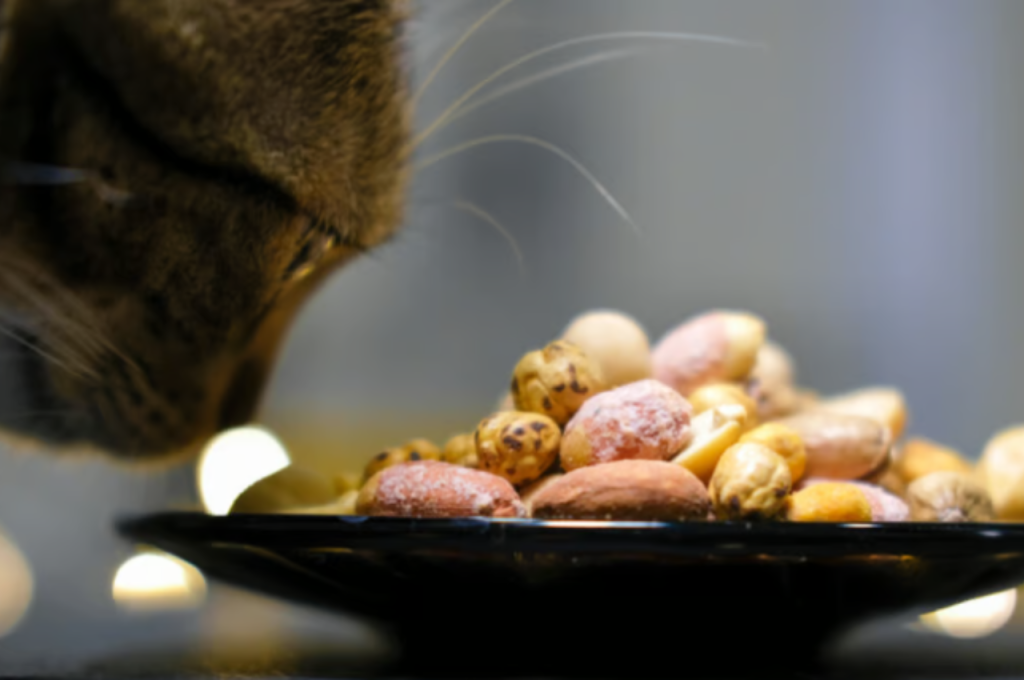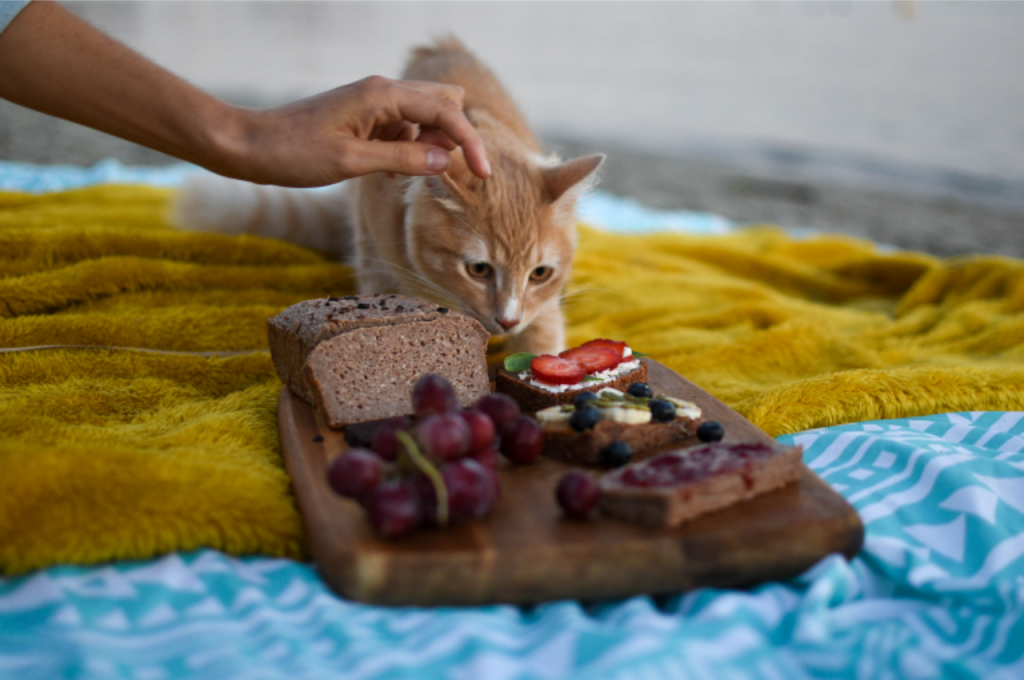Nuts are a popular snack enjoyed by many people worldwide, but when it comes to sharing our favorite treats with our feline friends, caution is key. Nuts are toxic to cats and can lead to serious health problems or even be fatal. While many nuts are safe for humans to consume, they contain high levels of fat and oils that can cause digestive issues and pancreatitis in cats. In this article, we’ll explore the potential dangers of feeding nuts to cats and provide insight into why they should be avoided in a feline’s diet.
Common Nuts
In today’s blog post, we will discuss whether nuts are safe for cats to consume. While many nuts are a delicious and healthy snack for humans, they may not be suitable for our feline friends. In particular, some nuts can be toxic to cats and cause various health issues. In this section, we will focus on common nuts like hazelnuts, walnuts, and pistachios and examine their potential effects on cats’ health.

Hazelnuts
Hazelnuts are a popular nut known for their distinct flavor and versatility in various dishes. However, when it comes to cats, it’s crucial to keep hazelnuts out of their reach. These nuts contain high levels of phosphorus, which can be harmful to cats in excessive amounts. Consumption of hazelnuts can lead to kidney problems, such as kidney stones or kidney failure. It’s best to prevent your cat from accessing hazelnuts to ensure their well-being.
Walnuts
Walnuts are a common nut packed with healthy fats, vitamins, and minerals. While they can provide numerous benefits for humans, they pose a threat to our furry companions. Walnuts contain a toxin called juglone which can be harmful to cats. Ingesting walnuts may cause gastrointestinal distress, vomiting, and diarrhea in cats. Additionally, the high-fat content in walnuts can lead to pancreatitis, a serious inflammatory condition. It’s important to keep walnuts away from your cat’s reach to protect their health.
Pistachios
Pistachios are a popular snack known for their distinct taste and vibrant color. However, these tasty nuts can be harmful to cats if consumed in large quantities. Pistachios contain a toxin called aflatoxin, which can have adverse effects on cats’ health. Consuming pistachios can lead to liver problems, including liver failure and toxicity. Furthermore, the high fat and salt content in pistachios can strain a cat’s digestive system and may cause diarrhea or other gastrointestinal issues. Safeguard your cat’s well-being by keeping pistachios out of their reach.
While nuts can be incredibly beneficial for humans, it’s important to remember that they may not be suitable for our furry friends. Cats have unique digestive systems and metabolisms, which can make some nuts toxic or cause adverse reactions. It’s always best to consult with your veterinarian before feeding your cat any human foods, including nuts. By being cautious and aware of the potential risks, we can ensure our cats stay healthy and happy.
Health Risks for Cats
When it comes to the health risks for cats, understanding what foods are safe for them is essential. Nuts, while a healthy snack for humans, can pose serious dangers to our feline friends.
Toxic Components
Nuts contain substances like tannins and oils that can be harmful to cats if ingested. These toxic components can lead to various health issues, ranging from mild discomfort to severe illness.
Gastrointestinal Issues
One of the primary risks of cats consuming nuts is the development of gastrointestinal problems. Cats may experience symptoms such as vomiting, diarrhea, and abdominal pain.
Nut consumption can also lead to pancreatitis, an inflammatory condition that affects the pancreas. Affected cats may exhibit signs of lethargy, loss of appetite, and dehydration.
Symptoms of Nut Toxicity
Nuts are a common snack enjoyed by many people, but they can be harmful to our feline friends. Cats have different digestive systems and metabolisms compared to humans, making them more susceptible to certain toxins found in nuts. In this article, we’ll explore the symptoms of nut toxicity in cats and provide essential information for cat owners to recognize and respond to potential emergencies.

Vomiting
If your cat has ingested nuts and starts vomiting frequently, it could be a sign of nut toxicity.
Diarrhea
Watch out for consistent or severe diarrhea in your cat, as it can indicate nut toxicity.
Loss of Appetite
Another symptom of nut toxicity in cats is a sudden loss of appetite. If your cat is refusing food, it could be concerning.
Treatment for Nut Toxicity
Cats are known for their curiosity and tendency to explore, which sometimes leads them to ingest things they shouldn’t. Unfortunately, nuts are one of those items. If you suspect that your cat has ingested nuts and is showing symptoms of toxicity, prompt treatment is essential. Here’s what you need to know about the treatment for nut toxicity in cats.
Inducing Vomiting
Inducing vomiting may be necessary if the ingestion of nuts has occurred within the past two hours. However, this should only be done under the guidance of a veterinarian. Attempting to induce vomiting without professional assistance may cause additional harm to your pet.
Fluid Therapy
Fluid therapy is crucial in treating nut toxicity in cats. Providing fluids through intravenous or subcutaneous methods helps to flush out toxins from the cat’s system and maintain hydration, aiding in their recovery process.
Activated Charcoal
Activated charcoal may be administered by a veterinarian to help absorb any remaining toxins in the cat’s digestive system. This can limit the absorption of harmful substances and promote their elimination from the body.
Prevention and Safety Measures
Discover essential prevention and safety measures regarding nuts and cat safety. Find out if nuts pose a toxic risk to feline friends. Prioritize your cat’s well-being through informed dietary choices and pet-proofing strategies for a safe environment.
Keep Nuts Out of Reach
– Place nuts in secured containers in high cabinets or pantries.
– Ensure trash cans with nut remnants are covered tightly.
– Restrict access to areas where nuts are stored or consumed.
Offer Safe Alternatives
– Provide cat-safe treats like small pieces of cooked meat or commercially available cat treats.
– Catnip or cat grass can serve as engaging alternatives for play and enjoyment.
By following these precautions, you can protect your cat from the dangers associated with nuts ingestion.
Surprising Foods with Nuts
When it comes to the safety of our feline friends, it’s important to be aware of potential dangers lurking in unexpected places. While we may know to keep nuts away from our cats, it’s essential to realize that nuts can also be found in some surprising foods. In this section, we will explore three categories of foods that may contain nuts, posing a potential risk to our feline companions: Nut Butters, Baked Goods, and Trail Mixes.
Nut Butters
Nut butter, such as peanut butter, almond butter, and cashew butter, are popular spreads enjoyed by many. While humans can safely indulge in these tasty treats, it’s important to keep them away from cats. The high-fat content in nut butters can lead to pancreatitis in cats, a condition characterized by inflammation of the pancreas. Furthermore, some nut butter may contain xylitol, an artificial sweetener that is highly toxic to cats. Always read the ingredient labels carefully and keep these tempting spreads out of your cat’s reach.
Baked Goods
Who can resist the aroma of freshly baked goods? Unfortunately, some baked goods may contain nuts, making them a potential hazard for cats. Treats like cookies, cakes, and pastries may be made with nuts or contain nut oils as flavorings. Even a small amount of baked goods with nuts can pose a risk to your feline friend. It’s best to avoid sharing your favorite nut-filled treats with your cat and opt for cat-specific treats instead.
Trail Mixes
Trail mixes, often considered a healthy snack, can be a hidden danger for cats. These mixes typically include a variety of nuts, dried fruits, and sometimes even chocolate. Just like nuts themselves, chocolate is toxic to cats and can cause serious health issues. Additionally, dried fruits in trail mixes may contain sulfites as preservatives, which can be harmful to cats as well. Ensure that any trail mix is kept well out of your cat’s reach to avoid any potential accidental ingestion.

Frequently Asked Questions On Are Nuts Toxic to Cats?
Sure! Here are some questions about nuts toxic to cats:
Q. Are nuts safe for cats to eat?
A. Nuts are generally toxic to cats due to their high-fat content and potential to cause digestive issues. Some nuts, like almonds or peanuts, may not be toxic but can still pose a choking hazard. It’s best to avoid giving nuts to cats altogether.
Q. Can cats eat peanut butter?
A. Cats can eat a small amount of plain, unsalted peanut butter occasionally as a treat. However, peanut butter should not be a regular part of their diet due to its high-fat content. Always check for any signs of allergies or digestive issues after feeding.
Q. Are specific types of nuts toxic to cats?
A. Certain nuts like macadamia nuts, walnuts, and pecans are highly toxic to cats and should never be given to them. These nuts can cause severe reactions such as vomiting, diarrhea, or even neurological issues in cats. It’s crucial to keep these nuts away from your feline friend.
Conclusion
Ultimately, it’s crucial to prioritize your feline friend’s well-being. While nuts can be harmful to cats, moderation and caution are key. Always consult with your veterinarian before introducing new foods to your cat’s diet. Remember, their health and safety should be the top priority.
Make informed decisions for a happy, healthy cat.
